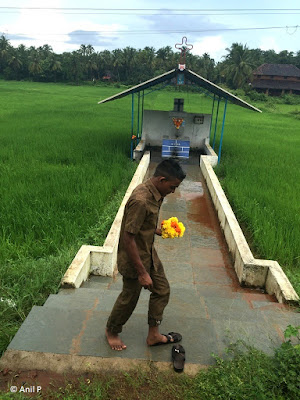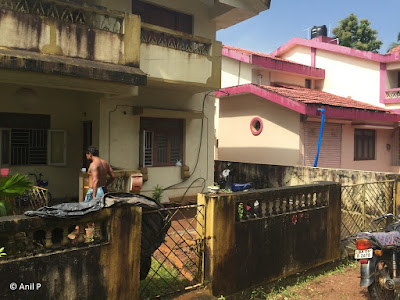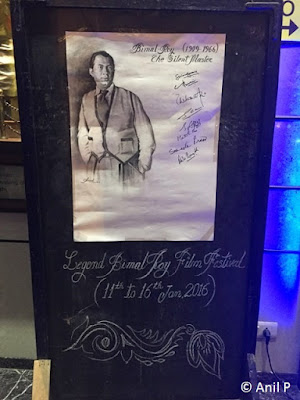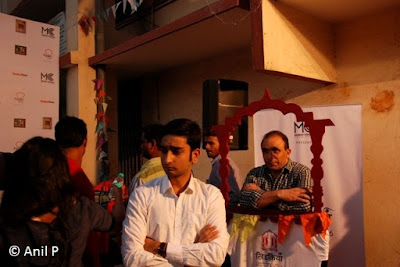We reached
Sathaye College
in Vile Parle just as the
Open Mic session
of Day 2 of the theatre festival,
Khidkiyaan,
kicked off on a small elevated stage overlooking the short passageway leading
from the entrance gate to the small auditorium built by the college.
The proceedings on Day 2 of
Khidkiyaan Theatre Festival were
scheduled to begin with an
Open Mic
session with Piyush Mishra and Manu Rishi Chadha while Sudhir Mishra, Makarand
Deshpande, Richa Chadda and Sushant Singh Rajput graced the event as Guests of
Honour for the evening, enough star power to have the place buzzing the far
corner of Sathaye College.
The only plays we’ve attended before
at the Sathaye College auditorium were those Mujeeb Khan staged of Munshi
Premchand’s stories, casting his students learning their craft at his IDEA Theatre Group.
Prem Utsav is an
annual fixture at
Sathaye
College in the monsoons
and we’re annual fixtures at
Prem Utsav.
Khidkiyaan seemed to follow the same script except for the choice
of plays, an eclectic mix ranging from Gunno Bai (Director: Chittaranjan
Tripathy) and Old Munk (Director: Dheerendra Dwivedi) to Koi Bat Chale (Director:
Ramji Bali).
Unlike Khidkiyaan, Prem Utsav
hasn’t structured an Open Mic with
Star Power component into its scheme of things. Mujeeb Khan has a different
idea and ideal.
Organised by Mukesh Chhabra
Casting Company, Khidkiyaan 2016 is
the first edition of the theatre festival, a welcome addition to the growing
theatre scene in Mumbai.
Scheduled to run five days,
starting Jan 13, the new kid on the block picked Vile Parle to stage its first avatar,
a welcome change from the usual suspects,
South Bombay,
and Bandra.
Mukesh Chhabra Casting Company has associated with
Bombay Times to bring
Khidkiyan Theatre Festival to life. Hola Chef is listed as Food Partner though I saw no food of any kind on offer at the venue.
Khidkiyaan ends tomorrow, Jan 17, with Poetry Reading and Performance
by Ayushmann Khurrrana (5 pm), followed by
Piyush Mishra (6 pm) before giving
way to the Festival Director, Mukesh Chhabra, for his talk “Insight into Casting”
(7 pm).
Anurag Kashyap, Nandita Das and
Tigmanshu Dhulia will grace the evening as Guests Of Honour before Koi
Baat Chale, a play directed by Ramji Bali, and scheduled for 8 pm, brings
the curtain down on Khidkiyaan theatre
festival.
If what we experienced on Day 2
is any indication, tomorrow will be another cracker of a day at Sathaye College.
~
Each day at Khidkiyaan, with the exception of the last day, sees Open Mic followed by a play staged
twice, 6:00 pm and 8:00 pm, with free passes given out at a stall outside the
entrance, half-hour before the play kicks off.
A young student at Mukesh Chabra
Casting Company volunteering at the stall giving out the Theatre Festival
schedules and free passes repeated over the din of the queue growing outside
his stall, “Only after people with passes issued prior (via online
registrations) have settled in the auditorium will we give out passes for seats
that remain vacant.”
“Make two lines, please”, he
called out over the jostling crowd of mostly youthful North Indians.
“Those who don’t mind watching
the 8:00 pm re-run, please leave the queue as we only have a few passes to give
out and most of you won’t get the passes for this show (6:00 pm),” he informed
the crowd before repeating, “Most of you in the queue won’t get passes for the
6:00 pm show. Come back for the 8:00 pm show.”
The din in the queue and arguments
breaking out over queue break-ins prompted another volunteer into quieting the
crowd, “The Open Mic is on, loud chatter here is drowning out voices on the
stage,” she berated.
I was squeezed for breath in the
queue, holding fast to my footing in face of overt and covert edging by
potential claimants to limited entry passes.
Trust Mumbai to throw up demand
to overwhelm supply.
Eventually, he gave out 10 passes
once he got word from inside the auditorium. I got the last one of the lot. It
meant that only one of us could get in to see Shadow Of Othello
directed by Ishteyak Arif Khan; it would be K who had just finished with
attending Open Mic while I was in the queue for the entry pass.
Shadow Of Othello is a
drama set in “a small village in staunch
northern rural area of India”
where “some unemployed, loafers,
half-employed and confusingly employed people, who get inspired by a Hindi
feature film ‘Omkara’ to the extent that they start planning to recreate the
film. But, soon they realise that to make a film is not their cup of tea and
they all decide to make a play.”
The drama or “Dramedy” as the
brochure categorises it, is how they go about realising their “Omkara” inspiration.
~
Open Mic is open to all and is
staged in a small open passage leading in from the entrance gate to one end of
the Sathaye College campus.
While waiting for
Open Mic to
commence,
Sudhir Mishra, the maker of
Is Raat Ki Subah Nahin (1996), a film I
saw years ago, one that introduced me to alternative storytelling and turned me
into a
Tara Deshpande admirer, floated around quietly with a mug of steaming
something, obliging attendees with selfies, barely registering a change in
expression the entire time.
He answered patiently the
questions a camera crew of two women put to him, something to do with his
culinary prowess of the lack of it, and other aspects of his existence.
At the same time that Sudhir
Mishra was taking questions from the camera team, Richa Chadda was striking a
pose for the rest of the press who had ranged around her, forsaking the gaunt
Sudhir Mishra.
Later, every camera on view,
including yours truly, gathered around Richa Chadda and Sushant Singh Rajput as
they struck the customary pose framed by Khidkiyaan logo.
Mukesh Chhabra wound his way into
the mix.
A small band had stationed inside
the entrance and every once in a while they would light up with band music,
most likely on cue from someone in the organising committee.
And when they did, all heads
would turn to the entrance searching for a familiar face from the entertainment
world being accorded a welcome.
The music band only stopped their
short intense bursts of welcome once
Open Mic got underway with
Piyush Mishra taking the stage.
With space barely two cars wide
and six car lengths long, the crowd attending Open Mic was parked tight.
From the queue, I could hear Piyush Mishra ease into songs after a brief tête-à-tête with a charming host; his voice rendered the late afternoon melancholic.
The 'feeling of an emotion' is decidedly different from the 'emotion of a feeling' - the audience sensed the former as his poetry brought the latter to the fore, so much so that his occasional bout of coughing failed to break the rhythm the lyrics laid into the approaching evening.
He alternated between songs and poems though it's difficult to distinguish between the two, occasionally relapsing into explanations that drew laughs.
Streamers ran above. Lights,
camera crews, a music band and youthful enthusiasm added to the festival
atmosphere.
Theatre and Bollywood
enthusiasts, and aspirants decked out smartly, holding their poise and manner,
formed the bulk of the attendees.
Smiles abounded as introductions
were made, old acquaintances renewed. If I looked hard I might’ve been able to
count stars in the eyes of many gathered there.
From the t-shirts sporting the
Theatre Festival logo, an outline of a window, it was apparent that students of
Mukesh Chhabra Casting Company were a significant presence.
Some were volunteering at the
stalls, one of which had on sale Piyush Mishra’s book of poems, Kuch Ishq Kiya,
Kuch Kaam Kiya, written over a period of twenty years. Published by Rajkamal
Prakashan, it was released at the New Delhi World Book Fair. His other book on sale was Mere Manch Ke Sargaam.
~
This was only the second time I
was seeing Piyush Mishra on stage. The first was at the Times Literary Festival at Mehboob Studios (Bandra) some years ago.
His demeanour, atleast to my
eyes, was unchanged, alternating between direct, dismissive, thoughtful, curt, condescending,
casual, bored, and expansive, a mark of someone who only relents to being in
the thick of things even as he chaffs at it, a hint at idealism at play in an
unforgiving industry wedded to glam sham.
If his seeming pre-occupation
with his phone for much of the evening except when on stage, taking and making
calls, receiving and answering messages or merely scrolling through them in the
middle of selfies with adoring fans attempting conversations, short interviews
in-camera for networks, and customary photo-ops framed by Khidkiyaan logo, were any indication of restlessness or bechaini
then his book of poems will make for an interesting reading.
He was curt but never insulting,
a persona that goes with sharp edge he brings to his work, one that is
refreshing and original. His songs in Gulal is a case in point.
After he was dragged, reluctantly
it seemed, for a short in-camera interview with a duo of bright, pretty,
nervously smiling anchors looking for light hearted sound bytes on cooking
skills and the like, they asked him what he thought about Khidkiyaan Theatre
Festival.
If they expected him to launch
into a long monologue, a bullet list of pros a theatre festival of this nature
brings to the table, or praise for the organiser, they had asked the wrong
person.
“It’s good, has to be good,” he
replied with a mildly taken-aback look that seemed to say “it can only be a
good thing isn’t it? Why isn’t it obvious to you?”.
By all measures, Khidkiyaan 2016,
was a success insofar as the buzz it generated for the event.
~
K messaged me from inside the
auditorium that the entry pass hadn’t fetched a seat, likewise for about 50
others.
I remarked to the youth who had
heaved a sigh of relief on the queue dissipating that if the first edition is
any indication, the next one will need to look for a larger auditorium to
accommodate the audience.
Lights had come on and groups of
festival attendees had formed by the stalls, the entrance gate, on steps, and the stage
as they awaited their turn for the 8 pm re-run of Shadow Of Othello.
Behind me, a youth in red was
going on about his experiences answering calls for auditions. His friend with a
distinctive hairdo, not a strand out of place, listened in silence, only
occasionally interjecting the other’s narration to move it along.
The evening had cooled to Mumbai
winter standard and only the urge to visit the washroom interrupted his
narrative as they made for the washroom for relief.
I watched as introductions were
made, smiles exchanged. Conversations veered around acting, opportunities and
entertainment industry gossip.
With Hindi drama serials ruling
the roost on the telly, it was not uncommon to spot familiar faces in the mix
while teams working behind the scenes were not as easily apparent, Ranpreet
being an instance.
Ranmeet sat on the edge of the
small stage waiting for the clock to strike 8 pm. She was with friends from the
industry when I first heard her raise her voice in mock authority and turn to
her friend, laughingly, “Thappad Marungi. Main U.P. Ki Sardarni Hoon.” They
dissolved into smiles.
She’s an Assistant Director and
has assisted Directors of films and television serials. After we got talking she spoke
about the struggle inherent in the entertainment industry, and of the need to be
visible all the time to get work.
“If you take a long break, it’s
difficult to get back in the things again,” she commented. “Once I build a
reputation for being a good Assistant Director, things will get better,” she
said, implying that the grapevine is critical to get word of reputation and
work ethic around. It cuts both ways.
“But I absolutely love this
field,” she said, her eyes outshining the lights blazing down on the patch by
the stage.
“When scenes are crafted on the
sets, I try and anticipate the Director’s sequencing of the scene for the
camera. And when I get it correct, I’m happy as it means I’m learning well to be able to get it
right,” she enthused, her eyes lighting up.
From where I sat, I saw no quiet
corner. The night buzzed in that low tone that corners lit up by light insulate
those they shelter.
Shadows shortened, lengthened and
disappeared as attendees moved about, seeking assurance for hopes, aspirations,
failures and the like. Only in such gatherings can these assurances play out.
While breaking into Bollywood
films remains a tough ask, the opportunities television serials offer means
casting companies will continue to see aspirants flock for training, and most
importantly placements.
And theatre is where they can
hone their skills, and network for opportunities.
~
Combining the business of casting
with the business of theatre production, Mukesh Chhabra has hit the sweet spot
with Khidkiyaan, ensuring the
combination scheduled for the duration of the event remains relevant to the
aspirations of the bold and the beautiful while providing a platform that
raises visibility for the intersection of the two.
I expect Mukesh Chhabra will
touch upon it in his talk tomorrow – Insight
Into Casting.
The building of the brand has
only just begun and if the response to the first edition of the Khidkiyaan Theatre Festival is anything
to go by, it’ll see a long run.















































































